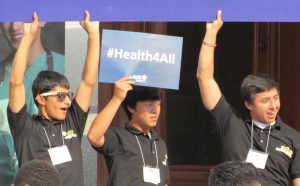
Three teens from Del Norte County join a rally in Sacramento on Aug. 6. From left to right, Alberto Barraza-Flores, Rees Her and Cody Alarcon.
On Aug. 5 and Aug. 6 this year, about 100 youth converged on the State Capitol in Sacrament, under the umbrella of the Alliance for Boys and Men of Color. They walked the hallways, meeting with lawmakers and their staff to push for laws that help young men of color succeed and live healthy lives in California.
One group came from Del Norte, a rural county of 28,000 in the far northwest corner of the state. While many youth from other areas were able to meet with their representatives, these youth found it harder. They couldn’t get an appointment with Democratic Assemblyman Wesley Chesbro, who represents Del Norte, but knocked on his door anyway and talked to a staffer, hoping their message about the lack of resources in the county would be conveyed, as well as the need for more job creation and better quality education.
The appointments the Del Norte teens had with the offices of other legislators were even more disappointing, as most didn’t even know the location of Del Norte. “It was shocking that people didn’t know a county in the state they represent. It was hard to talk about problems in our community to people that didn’t even know it existed until we got there,” said Cody Alarcon, one of the youth.
I sat in on meetings between youth from South Los Angeles and their legislators, and they got a respectful listening as well as encouragement, in contrast to the Del Norte youth’s experience. Those in rural areas have reason to feel frustrated that they’re often cut off from the political process, even when they show up to the Capitol, since many politicians don’t know the county. And it’s a loss, as these rural counties are areas of splendid beauty, natural resources and human potential, and ideas from Sacramento on how to support those attributes is critical.
